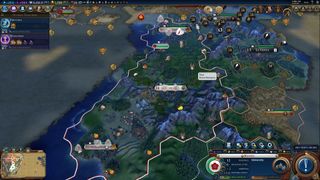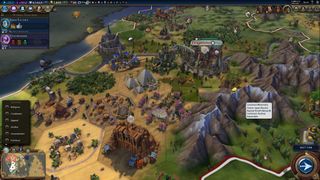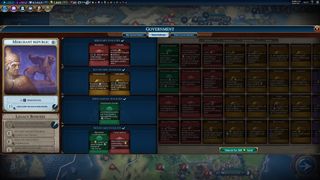'Civilization VI,' Hands On: Making Each Turn Count (Update: Now Available)

Update, 10/21/2016, 7:25am PDT: The wait is finally over. Civilization VI is now available for purchase. A list of retailers where you can purchase the game is at the bottom of this article. Civ VI will run you $60, but the "Digital Deluxe" edition is $80.
Update, 10/17/2016, 11:00am PDT: Civilization VI arrives at the end of the week, and 2K just released a launch trailer for the game. The game is also available to pre-load today.
The last time I played Civilization VI, I had 60 turns to try out some of the new features. This time around, I had some more time to see how the game’s new mechanics would play out in the long run. After a few hours and over 200 turns, it started to feel similar to previous Civilization games, but it will take some time to adjust based on the challenges posed by the new features.
A Choice In Production
Perhaps the most glaring difference in this game is the fact that Builders (known in previous games as Workers) have a limited amount of turns before they disappear. In the past, the Builders were units that never expired, so you could get away with a small army of them at the beginning of the game and build a few more as your empire expanded.
This was my strategy in past titles. Needless to say, that was thrown out the window with the new Builders. At turn zero, I had to make a choice: I could create Builders every few turns to cultivate my resources, create a strong military force, or opt for a rapid expansion with Settlers and defensive units. To make matters worse, barbarian units were rampant throughout the map. The first few turns used to be a no-brainer, a simple stratagem where I could make a quick foundation for mid- to late-game moves. Instead, I had to stop and think carefully about every decision.
Once a Builder is created, however, there are a few turns where you have some breathing room to ponder about what to build next. Considering the fact that Wonders have specific requirements for construction, you might want to send out a scout to survey the surrounding area (more on this later). Barbarian scouts will eventually find your cities, and these scouts will call in their more aggressive counterparts to harass your progress, so you might want a few Warriors to defend your city. In any case, the first few turns are more crucial than ever.
City Expansion
Once the first few cities were built, it was time to focus on improving the infrastructure with multiple structures for resources as well as large districts. For the most part, the resource structures such as farms and mines still have the same mechanic as previous games: They take up a tile inside the city limits and generate production, food, or other resources. However, other important buildings such as the barracks, temples, or markets are built inside specialized districts.
Stay on the Cutting Edge
Join the experts who read Tom's Hardware for the inside track on enthusiast PC tech news — and have for over 25 years. We'll send breaking news and in-depth reviews of CPUs, GPUs, AI, maker hardware and more straight to your inbox.
Like resource structures, these districts will also take up a tile surrounding the City Center (which is also a district by itself). By placing a district on a specific tile, you lose that tile’s resources, so it’s important to choose a location that doesn’t provide a massive amount of resources to your city. Some of the districts aren’t available at the beginning, and you’ll need to unlock them through technology research. Obviously, each district has a theme that corresponds to the buildings you put into it. An Encampment district is for military structures, whereas a Holy Site is for religious buildings. There are also districts for industrial, commercial, technological, and entertainment buildings that are available to you as the game progresses.
Each city can have multiple districts, so it’s possible to have your capital as the center of production, entertainment, and research for your growing empire. If you have your Settlers create cities in the right place, there’s even more room for specialization. A city surrounded by production tiles can be a manufacturing powerhouse while another metropolis can provide an abundance of food.

This strategy of carefully placing each city in a specific location is also important when it comes to creating Wonders. You can have a flourishing city at the start of the game, but if there isn’t a desert tile within the city limits, it’s impossible to build the Pyramids. The same idea also goes for The Hanging Gardens, another early Wonder, which requires a tile next to a river. This further underlines the fact that it is crucial to construct cities in the right spots. Choose a wrong location and you’ll see rival civilizations get an early head start as they complete one Wonder after another.
In order to keep your civilization successful, you’ll need to pick a form of government in addition to multiple civics. This mechanic replaced the social policies feature in Civilization V, and it seems to be a better method of providing bonuses to each empire. Each government type is made up of two to four civic sections: military, economic, diplomatic, and a wild card. As you continue to discover new civics alongside the traditional research of new technology, you gain more civil cards that correspond to each of the four slots.
Depending on the government, the number of slots available in each of the four sections can vary. One government might have three military card slots and one diplomatic slot that reflects its militaristic goals, whereas another might have a balance between all four categories. There are multiple governments to choose from, and they unlock after you research specific Civics, so you’re bound to find one that fits your style of play.
The Rest Of The World
Of course, it’s hard to ignore the other civilizations that you meet throughout the game. As usual, the leaders of other nations will be friendly at first, but based on later actions, they might have a more friendly or hostile attitude towards you. You can also choose to trade diplomatic deals such as an Open Borders agreement (which allows units from other civilizations to freely travel through your country) or exchange luxury resources.
It’s also easy to see each leader’s intentions based on what they give and what they want in a deal. At one point, the Scythian leader Tomyris wanted me to give her Open Borders access. In exchange, she provided a somewhat-tempting amount of money per turn in addition to some other resources. This might seem a bit desperate, but what she was trying to do was send her religious units across my borders in order to convert my cities to her religion so that she gained more bonuses for her civilization.
City-states also make a return from Civilization V. This time around, it seems that they’re a bit easier to bring under your empire’s umbrella with Influence points. As you continue to accrue Influence, you can send Envoys to the city-states. Send enough Envoys and you will get its bonuses. All you have to dictate is the number of Envoys sent to each city-state. To improve relations, you might also build a Trader to exchange goods. Whether it’s for a boost in Culture or Science or for military units, it’s a wise idea to have some city-states on your side.

Another way to give your civilization a little boost is through religion. In the early stages of the game, you create a Pantheon that provides a single bonus. Over time, you’ll have the ability to create your own religion, which is made up of multiple bonuses. Some of these boosts work better if more cities or nations convert to your religion. Obviously, you can send missionaries to spread the faith, but this time around, you can also have religious combat. Apostles, which are an improved version of missionaries, can fight opposing religious forces in an attempt to quell other faiths from entering your city. It’s a cold war of sorts between nations. All-out war is a costly endeavor, so exerting religious pressure on other civilizations is another way of taking out the competition. That is of course, if you have enough Faith points to make your religion the dominant belief.
Greatness From Small Beginnings
It’s easy to dislike the new mechanics in Civilization VI, especially when it changes a feature that drastically alters the way you play the game. However, I believe that the new features will make each turn more meaningful. From turn 1-500 (and beyond), you’ll have to make carefully-planned moves such as deciding what to build next or which city to improve. One wrong move can set back your plans for a few turns, which gives the lead (and possibly the victory) to an opposing faction.
In a way, that strategic mentality is always at the heart of the Civilization games. This latest version just sticks out from the rest due to its drastic changes, but that shouldn’t be a problem after a few playthroughs. All it takes is time to get acquainted with the new features, and before you know it, you’ll begin to tell yourself, “One more turn. Just one more turn.”
-
husker Someone please correct me if I missed it, but I'm still waiting for a fix to a Civ V bug that affects workers. Basically, workers "forget" their assigned task after every turn, forcing you to remember every task assigned to every worker and re-assign them every turn. A real pain because many tasks could take tens of turns to complete basically killing the game. I shouldn't have to buy a whole new game just to get this bug fix.Reply -
daglesj I bought Civ V a few months ago on Steam. Played it through about 3 times...cant really see what the fuss is about. Very samey and yeah a few bugs like above were tedious.Reply -
TJ Hooker @husker I've probably played hundreds of hours of Civ V and never experienced that bug, nor have I heard of it before.Reply -
husker Apparently, the bug was a result of a patch to the game. Here is a link to a couple of the many threads regarding the problem:Reply
https://steamcommunity.com/app/8930/discussions/0/882965118557457763/
https://forums.2k.com/showthread.php?197176-Workers-constantly-wake-up-from-construction-task-without-reason/page2 -
sillynilly Husker - over 650 hours here and no issue with the workers. Do you have the game set to automatically shift to units needing direction? I do and it never swaps to a lazy worker. Didn't look at your links but give that a go if you have it shut off.Reply
I cannot wait for Civ VI, looks amazing and the subtle yet important changes will add a neat challenge to the game. -
Virtual_Singularity I've always very much liked the Civ franchise and enjoyed the ones I tried. Looking forward to Civ VI also, though all depending, it may be worth waiting til it goes on sale.Reply -
LORD_ORION Beyond Earth didn't get the support it required and it still full of bugs.Reply
FU Firaxis, never buying from you again. -
sillynilly Reply18741582 said:Beyond Earth didn't get the support it required and it still full of bugs.
FU Firaxis, never buying from you again.
I don't have bug issues, but I just never got into BE. Hated the tech thingy (maybe I'm a simpleton, but damn it always was so frigging confusing to me.)
Regular earth-based Civs have always been a pleasure to play for me - I would say give Civ VI a try and delete Beyond Earth! -
therealduckofdeath BE was a failure and I can understand why Firaxis simply dropped it like it was the plague. I pre-ordered BE after playing Civ 5 for around 1,500 hours.Reply
I played Civ BE 34 hours before uninstalling it.
That said, Civ 6 has clearly learnt from all the errors BE came with. The biggest of them the error of thinking you can sell anything as long as you stick the name Sid Meier on it. -
Jan_26 Hm, after a whole day of playing so far I have following observations:Reply
Tech trees are quite empty, compared to Civ 5 there is so far just a fraction of buildings
District building is nice, but leads to a lot of micro management. Seems like my favourite gameplay (huge map, 2 civilizations) won't be doable.
Graphics - I don't know, that style doesn't suit me.
So far very mixed feelings.
Most Popular

